Islam in Cyprus
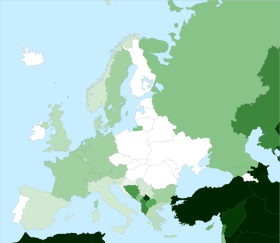
| < 1% | |
| 1–2% | |
| 2–4% | |
| 4–5% | |
| 5–10% | |
| 10–20% | |
| 30–50% | Macedonia |
| 50–70% | |
| 70–80% | Kazakhstan |
| 90–100% |
Islam in Cyprus was introduced when the island finally fell to Ottoman conquerors in 1571. Prior to this, the Muslim presence on the island was itinerant, with Arab raiders intermittently visiting and plundering coastal settlements. The majority of the Catholic Latin population of the island, along with a smaller subsection of the Greek Orthodox population, converted to Islam for preferential tax status - as dictated by the Ottoman millet system.[2]
Before the Turkish invasion of Cyprus in 1974, the Turkish Cypriots (the Muslim community of Cyprus) made up 18% of the island's population and lived throughout the island. Today, most of the estimated 264,172 Muslims are based in the north of the island. Turkish Cypriot society is markedly secular though, at least formally; adherents to the faith subscribe mostly to the Sunni branch, with an influential stream of Sufism underlying their spiritual heritage and development. Nazim al-Qubrusi, the leader of the Naqshbandi-Haqqani order, hailed from Larnaca and lived in Lefka. Another branch among the turkish cypriot Muslims is the Alevism. [3] There are a few Ahmadi Muslims in the country.[4]
History
Islam came to Cyprus early on in the Arab conquests though a permanent presence only followed the Ottoman conquest in 1571.
It is rumored that an aunt of the Prophet Mohammad, Um Haram, had accompanied one of the early Arab expeditions to the island. She fell off her mule, died and was entombed at the present Hala Sultan Tekke shrine.
Since the Turkish invasion of Cyprus in 1974, the Muslim population in the north of the island has been bolstered by settlers from Turkey who are almost exclusively Sunni Muslims. The status of these settlers is disputed under international law and specifically the prohibition, under the Geneva Convention, on the cross-border transfer of populations by states aiming to engineer changes in the demographic make-up of other states.
The segregation of Cypriot Turks and Greeks has effected that most of the Muslims in the territory controlled by the Republic of Cyprus are Arab immigrants and refugees, unrelated to the Turks historically living in the area.
Important landmarks
Several important Islamic shrines and landmarks exist on the island including:
- the Arabahmet Mosque in Nicosia (built in the 16th century)
- the Hala Sultan Tekke/Umm Haram Mosque in Larnaca (built in the 18th century)
- the Lala Mustafa Pasha Mosque, Selimiye Mosque and the Haydarpasha Mosque; former Catholic cathedrals left from the Crusader era, which were meant to cater exclusively to the Catholic minority which ruled the island and were converted to mosques after the Muslim conquest in the Middle Ages.
Gallery
 A mosque in Kyrenia
A mosque in Kyrenia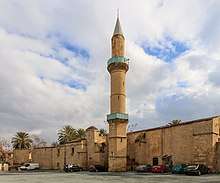
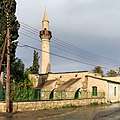 Tuzla Mosque in Larnaca
Tuzla Mosque in Larnaca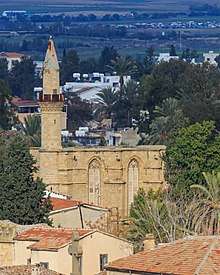 Haydar Pasha Mosque in Nicosia
Haydar Pasha Mosque in Nicosia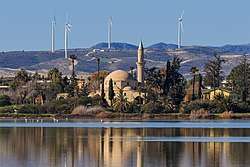 Hala Sultan Tekke with Larnaca Salt Lake in the foreground
Hala Sultan Tekke with Larnaca Salt Lake in the foreground Entrance facade of the converted cathedral (Lala Mustafa Pasha Mosque)
Entrance facade of the converted cathedral (Lala Mustafa Pasha Mosque) The Minaret of the Lala Mustafa Pasha Mosque
The Minaret of the Lala Mustafa Pasha Mosque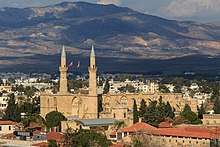 The Selimiye Mosque in Nicosia, general view
The Selimiye Mosque in Nicosia, general view Turkish Mosque in Limassol
Turkish Mosque in Limassol
References
- ↑ "Religious Composition by Country, 2010-2050". Pew Research Center. 12 April 2015. Retrieved 22 October 2017.
- ↑ "Cyprus under the Ottoman Empire". www.hellenicaworld.com. Retrieved 2016-04-08.
- ↑ http://www.kktcakm.com
- ↑ "MEMBERS OF THE AHMADIYYA MUSLIM COMMUNITY DR MUHAMMED JALAL SHAMS, OSMAN SEKER, KUBILAY ÇIL: PRISONERS OF CONSCIENCE FOR THEIR RELIGIOUS BELIEFS". Amnesty International. June 5, 2002. Archived from the original on July 4, 2014. Retrieved June 10, 2014.
See also
